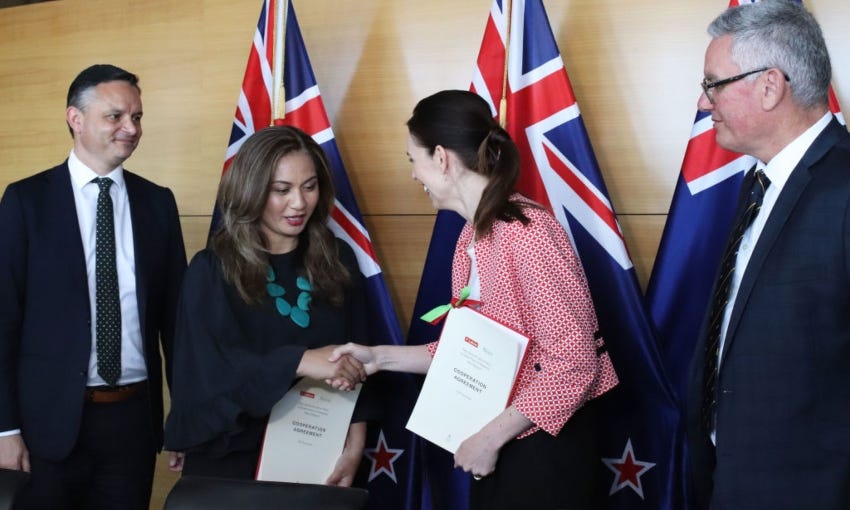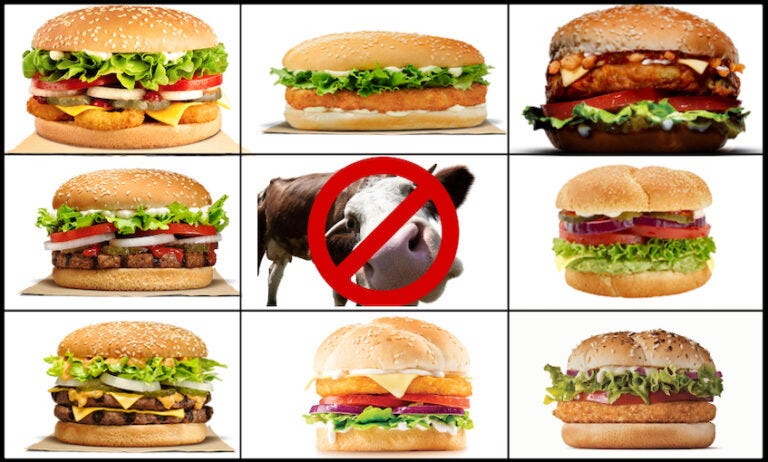Greens get a seat away from the table
They're neither fully in nor fully out, and some former MPs have been scathing about the deal being accepted

Good morning and welcome to The Bulletin for Monday November 2, by Alex Braae for The Spinoff. Presented in partnership with Z Energy.
In today’s edition: Greens sign cooperation agreement with Labour, Ardern to make cabinet announcements today, and where to now for drug reform after referendum falls?

Image: Jacinda Ardern and Marama Davidson shaking on it (Getty Images)
Green party delegates have ratified a deal with Labour that will give them ministerial portfolios, but mostly outside of cabinet where the big decisions of government are made. Co-leader James Shaw will continue as climate change minister, along with picking up an associate environment role focusing on biodiversity. And co-leader Marama Davidson will be minister for the prevention of family and sexual violence – a new position – along with being associate housing minister with a focus on homelessness.
As Justin Giovannetti reports, it's a cooperation agreement rather than either a coalition or confidence and supply agreement. This means that the Greens will remain a basically independent party outside of government, and the right to abstain on budgets and the sort of procedural motions that formally give the government the numbers to govern. While Shaw and Davidson will be outside of cabinet, they will be called in to cabinet committee discussions when their portfolios are directly affected. However, they'll also be bound by the expectation of collective cabinet responsibility, meaning they'll basically have to back cabinet decisions in their portfolio areas even if they disagree with them. As Giovannetti puts it, "it’ll be a difficult juggling act if the future government runs afoul of the Green base."
Writing about the agreement, professor Andrew Geddis says it represents a longer term strategy for both parties, who realise that they might need each other again in three years time. But the nature of the agreement means power still firmly resides with Labour. To quote:
But make no mistake, this agreement is all about how the Greens will slot in alongside the Labour government, rather than how the Labour government will bend to accommodate the Greens. The agreed upon areas of common policy development “represent areas where the policy and experience of the Green Party provides a positive contribution to the Labour government”. As far as Labour is concerned, the Greens are there to add value to their governing mission for the next three years, and will be allowed to participate only insofar as they do so.
While the Green delegates voted for the deal by a margin of more than 75%, the acceptance could cause some disquiet. It is understood that the margin in favour was less than the almost unanimous support among delegates given to the deal offered in 2017. Among the criticisms voiced by some activists and even former MPs is the fact that the titles aren't necessarily accompanied by the ability to spend real money addressing the problems, and therefore there's a power imbalance to deal with. Newshub reports Russel Norman and Sue Bradford have been particularly scathing.
Regardless, the Green co-leaders themselves have welcomed the agreement, while acknowledging that it may not always be smooth sailing, reports Radio NZ. Shaw has described it as a "win-win" for the Greens and Labour, while Davidson described it as an opportunity for "doing work with Labour productively as well as protecting our unique Green voice." And there's a fair argument to be made that they simply had to take the deal – after all, the point of being in parliament is to hold whatever positions of power you possibly can, so you can exercise whatever power the numbers give you. No doubt we'll check back in regularly over the next three years to see how it's all going.
Meanwhile, we're going to get some announcements today on who Labour will be putting into cabinet. There's been various informed speculation on the topic: Toby Manhire has had a crack at the big portfolios and a ranking of cabinet,, and you can read Stuff's Thomas Manch on the same here. The biggest portfolio to watch is of course health – whether Chris Hipkins takes it again, or whether it gets moved to a less already burdened minister.
You'll probably have heard the referendum results by now, but if not: On current projections, cannabis legalisation will fail by an extremely narrow margin. As my report from Friday points out, it is still possible for the result to be overturned on the special votes, but would require those specials to break to a very unlikely degree towards legalisation. Either way, the margins are such that a win would hardly be a ringing endorsement for legalisation, nor is the current loss really a vote of confidence in the status quo.
So what now? Drug policy is obviously still a mess at the moment, and calls have been coming thick and fast for more to be done, if not full cannabis legalisation. Auckland councillor Efeso Collins, who was part of the No campaign, came out immediately calling for decriminalisation, reports Radio NZ. Māori and Pacific Islanders suffer discrimination from the current laws, and participants in a debate on The Hui argued that something needed to change. Meanwhile, a common sense law change may go ahead, with Stuff reporting that festival drug testing will be looked at again by the government, with a view to preventing needless deaths from people taking unknown substances. One thing that has been ruled out is the government simply charging ahead and legalising cannabis anyway.
As for the politics of it all, PM Jacinda Ardern came out and said she voted yes after the results were released, far too late to make a difference. I highly encourage you to read this argument on The Spinoff by Madeleine Holden, unleashing on the politicians who might have understood that legalisation would lead to vastly better outcomes than the status quo, but were too timid to do anything to make it happen.
Comparatively, the End of Life Choice Act referendum has been fairly straightforward. Alice Neville reports 65% of voters have backed it in the preliminary count, making it safe from special votes overturning the outcome. The law will come into force in 12 months, and opponents are promising to closely scrutinise how it works in practice.
The Labour government has been quietly selling state houses to tenants, despite rubbishing a similar policy from National during the election campaign, reports Stuff's Thomas Coughlan. The mechanism for this is a continuation of a policy introduced by the last National government, and just over 100 were sold in this way over the first term. Labour's Megan Woods argues the situation is different, because the volume of sales is lower, and the government has been building new state housing faster.
From Friday: Mandatory Covid-19 testing of maritime worker crews will begin this week, reports Radio NZ. That will apply regardless of how long the crews are actually in New Zealand for, with some staying less than 24 hours. Over the course of this week, further details will be thrashed out with the shipping companies and the ports they work out of.
Bay of Plenty mayor Tenby Powell has been diagnosed with prostate cancer, and will take medical leave. The NZ Herald reports he will have surgery in late November, and look to resume his duties in the new year. Powell said the cancer was picked up by a blood test during a routine health check, and that other men of his age should be proactive in getting checked.
Got some feedback about The Bulletin, or anything in the news?
Drop us a line at thebulletin@thespinoff.co.nz

Right now on The Spinoff: Josie Adams has a fascinating interview with the weird and brilliant Robert E. Bartholomew, a world-leading expert on psychogenic illness and Auckland high school teacher. Justin Latif interviews Matt Renata on bringing Christianity to the protests at Ihumātao. Nina Hall assesses how a Biden presidency in the US would affect New Zealand. Sam Brooks reviews the new Black Hands tv show, which he argues does the Bain family little justice. Michelle Langstone writes about finding a new appreciation for being one person among a crowd. Linda Burgess writes about getting to the stage of the pandemic where life becomes grinding and boring. Tara Ward speaks to London-based Māori group Ngāti Rānana about being involved in the next season of The Crown. And Alex Casey makes a very welcome return to The Spinoff with a review and ranking of every meat-free fast food burger in New Zealand.
For a feature today, an excellent review of a book which I probably won't be able to bring myself to read. Writing on The Spinoff, Josh Drummond has taken on The Ministry for the Future, by novelist Kim Stanley Robinson, which addresses runaway climate change through eyewitness accounts. This excerpt deals with a particularly horrible phenomenon called the 'wet-bulb' effect.
That’s how The Ministry for the Future opens. In the very near future, a high-humidity heatwave stalls over Lucknow, India, and 20 million people simply die. We see this event through the eyes of a local aid worker called Frank as he toils furiously to save people, but eventually can only watch as everyone around him dies. First old people and infants, then the sick, then the healthy, then him.
It is one of the most brutal gut-punches I’ve ever experienced in fiction, because it reads less like prophecy and more like documentary. As I was reading, record wildfires raged in California and Colorado, bringing memories of less than 12 months ago when the skies over New Zealand turned an eldritch shade of red from Australian bushfires burning more than 2000 kilometres away. As I wrote this review, the New Zealand Government’s “Our Atmosphere And Climate” report came out, with the news that climate change is already happening, right here, right now. Then came news from NIWA that parts of the country are in for an unusually hot, humid summer, and possibly a marine heatwave, due to a strong La Nina system.
In sport, the All Blacks will keep the Bledisloe Cup after a rout of the Wallabies in Sydney. Writing on Radio NZ, Jamie Wall says this was an outcome that was always on the cards, based on the teams selected to run out and the pressure on the respective coaching teams. Australia's Dave Rennie sent out a relatively inexperienced team, and was duly punished. But for him, it will likely be more an experience in blooding youngsters for tests to come.
That's it for The Bulletin. If you want to support the work we do at The Spinoff, please check out our membership programme




